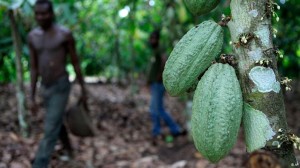By Moki Kindzeka
Africa’s cocoa producing countries stand to loose billions of euros in exports as the European Union tightens laws on the importation of cocoa beans. In April, Cameroon had their exports totally rejected.
As the town crier beats his drum inviting the villages of Ntui, an area in the center region of Cameroon, to gather together local farmers are worried. Cameroonian villagers say local cocoa buyers are being told that their beans are being rejected by European markets.
In the past, European importers purchase close to 95-percent of Ntui’s annual cocoa bean harvest. Kane Peter, a local farmer, told DW all farmers were worried by the situation since importation restrictions were tightened in April, 2013.
“We feel terrible. If they continue to reject [the cocoa beans] like that, the price will automatically fall,” Peter lamented.
Cameroon was the first African country to have its cocoa harvest rejected by the European Union, when 2,000 tonnes of beans failed to be certified in April. This, the EU said, was due to high levels of chemicals found in the product which they considered to be harmful to human health.
Cause and effect
Mark Yonker, a regulatory manager at the food distribution company Cargill in Paris told DW, the sub-standard conservation methods which are used is what’s behind the problem.
“The main problem is drying the cocoa artificially. When smoke comes in touch with cocoa beans, then you risk higher levels of what we call polycyclic aroma to hydrocarbons,” Yonker explained.
“Since April 1, 2013, we have a limit in Europe.” The food regulatory manager said of the EU’s new importation laws. Smoke is the main cause, drying cocoa on tarred roads is not part of good drying practices.”
Cocoa farmers in Cameroon generally dry their cocoa beans on tarred roads or smoke the produce in traditional ovens. European buyers had previously warned Cameroon’s cocoa farmers that such practises could have a negative effects on the health of consumers. Chocolate, which is derived from cocoa has become a multi-billion euro industry Farmer Kane Peter said it has been difficult for growers to abide with the new EU cocoa export legislation.
“The farmers are in a hurry, they will not persevere enough to ferment [the cocoa beans]. They will just take every thing and pack in the oven for two days in order to be able to go and sell it.”
Susan Ako, another farmer, added that poverty is to blame for their rush in wanting to get their cocoa harvest to the market. By so doing, they fail to observe the regulations.
“You know that cocoa comes from the farm during the rainy season. So farmers don’t persevere to dry their cocoa, they need fast money so they dry it anywhere.”











